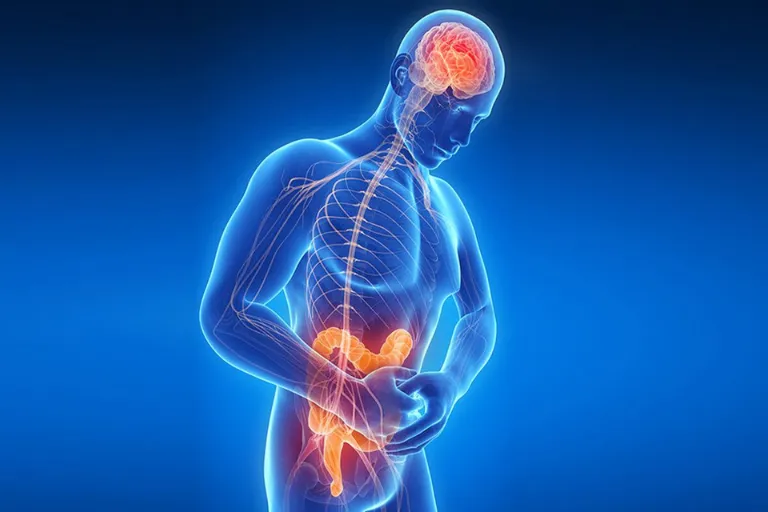Feeling forgetful, mentally sluggish, or like your thoughts are wrapped in cotton wool? You’re definitely not the only one feeling this way. Many people experience what’s often called “brain fog” — a hazy, slowed-down state that can make it hard to focus or recall things clearly.
While brain fog isn’t a formal diagnosis, it’s a real and frustrating experience. And surprisingly, the cause might not lie in your brain at all — but in your gut.
In this blog, we explore how gut inflammation and vagus nerve function may play a role in brain fog, and what steps may help support clearer thinking and better overall balance.
What Is Brain Fog — and Why Does It Matter?
“Brain fog” is a general term people use to describe a range of cognitive issues:
- Trouble concentrating
- Forgetfulness
- Low motivation
- Slowed thinking
- Feeling mentally drained or disconnected
These symptoms can appear on their own or alongside other issues like digestive discomfort, tiredness, or mood changes. While occasional brain fog may be due to poor sleep or stress, persistent symptoms may point to something deeper, especially involving gut health.1
The Gut–Brain Conversation
The gut and brain are in constant communication via the gut–brain axis — a two-way system where one of the key messengers is the vagus nerve. This long nerve connects the brainstem to the digestive system, heart, lungs, and more, acting as a major link between body and mind.2
It helps regulate digestion, heart rate, mood, and memory — but its role doesn’t stop there. The vagus nerve is also involved in calming inflammation after the immune system has been activated. This is part of what’s known as the cholinergic anti-inflammatory pathway, which helps bring the body back to balance once the initial response has passed.3
If vagus nerve function is disrupted — due to chronic stress, gut irritation, or tiredness — this anti-inflammatory signal may weaken. The result? Low-grade inflammation that lingers in the background, subtly affecting both gut health and mental clarity.
Could Gut Inflammation Be Affecting Your Mind?
Chronic gut irritation can trigger an immune response that doesn’t just stay in the gut. It can affect the entire body, including the brain. Here’s how it might contribute to brain fog:
Inflammatory Signals Travel to the Brain
When the gut lining is damaged or irritated, it can allow small particles and inflammatory molecules to “leak” into the bloodstream — sometimes called gut permeability. These signals can reach the brain, potentially affecting memory and focus.4
Reduced Vagal Tone
Studies have shown that lower vagal tone — meaning reduced activity in the vagus nerve — may be linked to both digestive symptoms and slower cognitive function.5 This can create a feedback loop: poor gut health weakens vagus nerve signalling, which worsens both digestion and mental clarity.6
Nutrient Absorption Issues
Gut inflammation can also affect how well nutrients are absorbed. When absorption is impaired, the brain may not receive enough B vitamins, iron, or omega-3s — all of which are crucial for clear thinking and energy.7,8
Common Triggers to Watch For
Several common factors may increase gut irritation and reduce vagus nerve activity:
- Highly processed foods
- Chronic stress
- Poor sleep patterns
- Lack of fibre or gut-friendly foods
- Long-term use of certain medications or antibiotics
Even low-grade, long-standing digestive symptoms — such as bloating, irregular bowel movements, or food sensitivities — could be contributing silently to brain fog.
Supporting Your Gut–Brain Connection Naturally
The good news is that simple lifestyle changes may support both gut health and vagus nerve activity — which could, in turn, ease brain fog.
Eat to Support a Calm Gut
- Focus on whole, unprocessed foods with plenty of colour and fibre
- Include fermented foods (e.g., yoghurt, kefir, sauerkraut) to help balance gut bacteria
- Avoid sudden diet changes if your gut is sensitive — introduce variety slowly
Practice Mindful Eating
- Chew food slowly and eat in a relaxed setting
- Avoid skipping meals, which may increase gut irritation or low energy
Stimulate the Vagus Nerve
- Try slow, deep breathing exercises—especially longer exhalations—to activate the vagus nerve and calm the nervous system.
- Gentle yoga or movement-based meditation may also help
- Singing and humming can stimulate the vagus nerve gently
- Splashing cold water on the face or ending a shower with cold water may trigger a vagus nerve response.
Get Enough Rest
- Sleep is when the brain resets — aim for consistent, restful sleep
- Create a calming evening routine and reduce screen exposure before bed
Stay Hydrated and Move
- Even mild dehydration can affect cognition
- Light exercise, such as walking, also supports bowel regularity and circulation.
Researchers are now looking at vagus nerve activity as a potential pathway for easing symptoms like tiredness, low mood, and gut irritation. While implant-based devices are still under investigation, early studies suggest that supporting vagus nerve tone through simple, non-invasive methods may be a promising direction.9 Although more research is needed, it highlights the growing interest in nervous system balance as a factor in overall well-being.
When to Speak to a Health Professional
If you’re noticing persistent brain fog, gut discomfort, or tiredness that interferes with daily life, it’s worth speaking to a health professional. They can help identify whether gut inflammation, nutrient gaps, or another medical issue may be playing a role.
Conclusion
Brain fog can feel vague and difficult to describe — but it’s often a sign that the body is trying to get your attention. The gut, brain, and vagus nerve form a powerful trio that influences how we think and feel.
By gently supporting your gut and tuning into daily habits, you may find more clarity — not just in your digestion, but in your thinking too.
Medical Disclaimer: This article has been written by a licensed medical professional and is intended for general informational purposes only. It does not substitute for personalised medical advice, diagnosis, or treatment. Readers should always seek the guidance of a qualified healthcare provider with any questions regarding a medical condition or health objectives. Never ignore or delay seeking medical advice based on information presented here.
Subscribe for Free for more insightful health articles tailored to your needs.
References
- Altinsoy C, Dikmen D. How Are Brain Fog Symptoms Related to Diet, Sleep, Mood and Gastrointestinal Health? A Cross-Sectional Study. Medicina. 2025 Feb 15;61(2):344.
- Han Y, Wang B, Gao H, He C, Hua R, Liang C, et al. Vagus nerve and underlying impact on the gut microbiota-brain axis in behavior and neurodegenerative diseases. Journal of Inflammation Research [Internet]. 2022 Nov;Volume 15:6213–30. Available from: https://www.ncbi.nlm.nih.gov/pmc/articles/PMC9656367/
- Serafini MA, Paz AH, Nunes NS. Cholinergic immunomodulation in inflammatory bowel diseases. Brain, Behavior, & Immunity – Health [Internet]. 2022 Feb 1 [cited 2024 Feb 23];19:100401–1. Available from: https://www.ncbi.nlm.nih.gov/pmc/articles/PMC8683952/
- Rundek T, Roy S, Hornig M, Cheung YK, Gardener H, DeRosa J, et al. Gut permeability and cognitive decline: A pilot investigation in the Northern Manhattan Study. Brain, Behavior, & Immunity – Health [Internet]. 2021 Jan 29 [cited 2024 Jul 10];12:100214. Available from: https://www.ncbi.nlm.nih.gov/pmc/articles/PMC8186438/
- Lopez Blanco C, Tyler WJ. The vagus nerve: a cornerstone for mental health and performance optimization in recreation and elite sports. Frontiers in Psychology. 2025 Jul 11;16.
- Mörkl S, Butler MI, Jolana Wagner-Skacel. Gut-brain-crosstalk- the vagus nerve and the microbiota-gut-brain axis in depression. A narrative review. Journal of Affective Disorders Reports. 2023 Jul 1;13:100607–7.
- Młynarska E, Jakubowska P, Frąk W, Gajewska A, Sornowska J, Skwira S, et al. Associations of Microbiota and Nutrition with Cognitive Impairment in Diseases. Nutrients. 2024 Oct 21;16(20):3570–0.
- Lu Y, Gwee X, Chua DQ, Lee TS, Lim WS, Chong MS, et al. Nutritional Status and Risks of Cognitive Decline and Incident Neurocognitive Disorders: Singapore Longitudinal Ageing Studies. Journal of Nutrition, Health & Aging [Internet]. 2021 May 1;25(5):660–7. Available from: https://web.s.ebscohost.com/ehost/pdfviewer/pdfviewer?vid=78&sid=c6bd5b33-966f-4e43-87b1-b001423ed947%40redis
- Mandalaneni K, Rayi A. Vagus Nerve Stimulator [Internet]. PubMed. Treasure Island (FL): StatPearls Publishing; 2021. Available from: https://www.ncbi.nlm.nih.gov/books/NBK562175/



